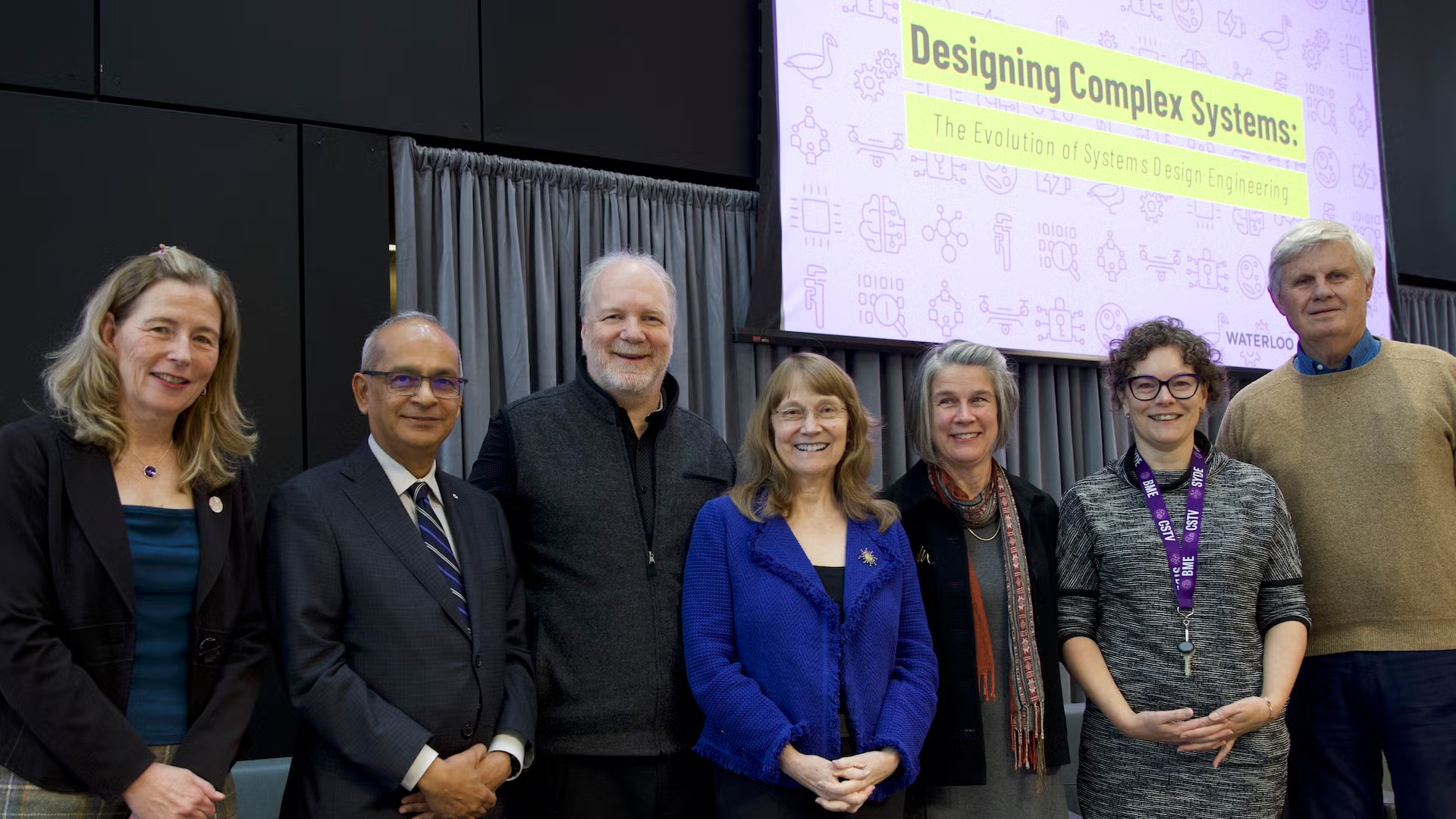$10.5 million gift empowers the future of systems design engineering

University of Waterloo alumni and longtime supporters David J. Cornfield (BASc ’85, LLD ’24) and Linda Archer Cornfield (LLD ’24) recently announced their transformational investment of $10.5 million to the Faculty of Engineering’s Department of Systems Design Engineering.
The gift accelerates the department’s ability to educate agile, ethical and impact-driven engineers by investing in people, learning spaces, research capacity and global experiences that connect design, sustainability and health.
“We are deeply grateful to David and Linda Cornfield for their generous gift, which strengthens Waterloo’s Systems Design Engineering program and advances our university’s vision to educate innovative problem solvers for a complex world,” said Dr. Vivek Goel, president and vice-chancellor, highlighting the importance and impact of this philanthropic contribution. “Their support is enabling new classrooms designed for active, collaborative learning, a named chair to renew core design courses and expanded opportunities for students to engage globally. Together, these investments empower our community to lead in creating equitable and sustainable solutions for humanity and our planet.”
A visionary contribution with an immediate impact
The gift is already making an impact with the establishment of the George Soulis Chair in Systems Design Engineering to advance the department’s founding vision — to educate engineers who can bridge systems thinking with design practice to create integrated, participatory and human-focused solutions to pressing global challenges.
Dr. Katherine (Kate) Sellen, a leading design researcher working at the intersection of health innovation and human-centred systems, was appointed the inaugural George Soulis Chair in May 2025. Sellen leads the renewal of core design courses and student spaces to enrich students’ interdisciplinary learning experiences and better equip them for an increasingly complex world.
Sellen has led the design of a new design classroom which opens in 2026. This expansion and modernization of existing spaces into larger, purpose-built classrooms will enable more active, collaborative and design-focused learning for students across the program.
“It’s been a busy first few months working with colleagues on a new classroom design and supporting some new research and teaching initiatives,” Sellen says. “It’s a warm and creative team and a privilege to be working together.”
The name of the new chair pays tribute to the legacy of the late professor George Soulis, one of the founders of systems design engineering at Waterloo. As a former student, David J. Cornfield credits Soulis’s drive for interdisciplinary innovation with shaping his own career, from working at Microsoft to becoming an award-winning documentary producer alongside his wife Linda.
“As 1A systems design students, we were self-selected ad-hoc problem solvers, but Professor Soulis gave us a powerful vision that design and problem solving could be studied as a discipline, reinforced by his practical workshop courses,” David says. “He described a general methodology that applied to every kind of problem — from technical to artistic to socio-economic — and showed how, by attending to this methodology, you could avoid many of the pitfalls that befall complex innovative projects. That foundation has been essential to every aspect of my career, and I’m very happy to honour Professor Soulis and support Systems Design Engineering in maintaining and expanding his vision of a transdisciplinary, practical engineering education.”
Giving students advanced learning spaces and experiences
The Cornfields’ gift invests in the student experience in tangible ways that prioritize learning environments, from upgraded facilities on campus to real-world problem-solving opportunities in the field.
Upgrades to biomedical engineering facilities are underway to enhance interdisciplinary research and graduate training. The new infrastructure will support teams advancing innovations in areas such as hearing loss diagnosis and treatment, and microrobotics for medical applications. The department is proud to name one of the spaces the David J. Cornfield Biomedical Engineering Lab.
The gift funds the department’s Clinician-in-Residence program which connects students directly with health-care professionals. Now in its second year, the current clinicians, a cardiologist and an occupational therapist, work on campus one half-day per week to consult with students, offer practical insights from the frontlines and facilitate shadowing experience in health-care settings. Through mentorship and in-clinic experiences, students gain a deeper understanding of how technology, people, and policy intersect within the health-care system.
Undergraduate students can now also broaden their co-op work term experiences through co-op research placements for students investigating AI, ethics and trust. A new Co-op for Good: Systems Design Engineering program has also been launched, which funds mission-driven placements with non-profits, charities or NGOs addressing social or environmental challenges. The program’s first two students are applying their engineering skills to real environmental and civic challenges while building strong technical and teamwork experience. One is advancing marine biodiversity and water quality through automated oyster-reef restoration research in the Netherlands, and the other is improving charitable effectiveness as a full-stack developer for a transparent donation platform.
The gift also supports the department’s efforts to educate engineers equipped to design responsible, impactful technologies through the Cornfield PhD Fellowship in Sustainable Energy Systems and two new courses: AI and Society and Technology and Film. Keeping with the department’s historical connection to Ashesi University in Ghana, the funds will also support ongoing partnerships with Ashesi with a four-week, place-based field course starting in summer 2026 where students will tackle local environment, water and health challenges in Ghana.
“This gift is directly elevating our students’ learning by embedding ethics and societal context into engineering education and expanding hands-on opportunities,” says Dr. Lisa Aultman-Hall, chair of the Department of Systems Design Engineering. “At the same time, our faculty members and staff are inspired by David and Linda’s passionate work and advocacy on climate change and social justice. It is such a pleasure to consider them part of our community.”
Feature image (left to right): Dean Mary Wells, President Vivek Goel, David J. Cornfield, Linda Archer Cornfield, Dr. Lisa Aultman-Hall, Dr. Kate Sellen and Dr. Ed Jernigan. Photo credit: Samuel Chen.





